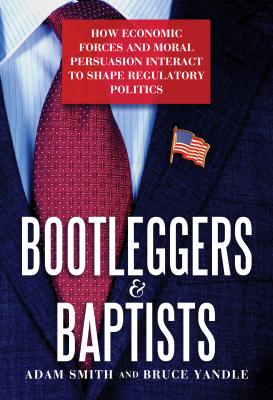Bootleggers & Baptists. Bruce Yandle
Чтение книги онлайн.
Читать онлайн книгу Bootleggers & Baptists - Bruce Yandle страница

HOW ECONOMICFORCES AND MORALPERSUASION INTERACTTO SHAPE REGULATORYPOLITICS
BOOTLEGGERS
& BAPTISTS
ADAM SMITHANDBRUCE YANDLE
Copyright © 2014 by Cato Institute.
All rights reserved. For information about reprint permissions, please contact Cato
Institute, 1000 Massachusetts Ave., NW, Washington, DC 20001.
Published by Cato Institute Press.
Library of Congress Cataloging-in-Publication Data
Smith, Adam C., 1982-
Bootleggers and Baptists : understanding America’s regulatory journey /
Adam Smith and Bruce Yandle.
pages cm
Includes bibliographical references.
ISBN 978-1-939709-36-3 (hardback : alk. paper)
1. Trade regulation--Political aspects--United States. 2. Business and
politics--United States. 3. Pressure groups--United States. 4. United States--
Social policy. 5. United States--Economic policy. 6. United States--Politics and
government--Moral and ethical aspects. I. Yandle, Bruce. II. Title.
HD3616.U47S546 2014
320.60973--dc23
2014017682
eISBN 978-1-939709-37-0
Cover design by Jon Meyers.
Contents
1. BOOTLEGGERS AND BAPTISTS: A WINNING COALITION
2. BOOTLEGGERS, POLITICIANS, AND PORK
4. SIN AND SUBSTANCE: WHO ARE THE REAL BOOTLEGGERS AND BAPTISTS?
5. THE ROCKY ROAD TO CLIMATE CHANGE LEGISLATION
6. TARP: A BOOTLEGGER WITHOUT A BAPTIST
7. OBAMACARE: TOO BIG TO PLAN (OR STOP!)
8. WHAT HAVE WE LEARNED? WHEN WILL IT END?
APPENDIX: BOOTLEGGERS AND BAPTISTS—THE EDUCATION OF A REGULATORY ECONOMIST
Just over 30 years ago in the May/June 1983 issue of Regulation magazine, a short piece appeared in the publication’s “Viewpoint” section. It was called “Bootleggers and Baptists: The Education of a Regulatory Economist” (Yandle 1983).1 Only four pages long, the article set forth a new theory of regulation, one that seemed consistent with the facts surrounding a large number of regulatory experiences. Using the economist’s standard concepts of supply, demand, and market forces, the theory was summarized as follows:
Politicians need resources in order to get elected. Selected members of the public can gain resources through the political process, and highly organized groups can do that quite handily. The most successful ventures of this sort occur where there is an overarching public concern to be addressed (like the problem of alcohol) whose “solution” allows resources to be distributed from the public purse to particular groups or from one group to another (as from bartenders to bootleggers). (Yandle 1983, 14)
In 1999, after 16 years spent observing Bootlegger/Baptist dynamics, the theory was described again in Regulation, this time a bit more tightly:
Here is the essence of the theory: durable social regulation evolves when it is demanded by both of two distinctly different groups. “Baptists” point to the moral high ground and give vital and vocal endorsement of laudable public benefits promised by a desired regulation. Baptists flourish when their moral message forms a visible foundation for political action. “Bootleggers” are much less visible but no less vital. Bootleggers, who expect to profit from the very regulatory restrictions desired by Baptists, grease the political machinery with some of their expected proceeds. They are simply in it for the money. (Yandle 1999b, 5)
The evolving theory filled a small niche in the growing field of public choice economics, a study area that represents a broad effort to apply economic principles to the area of politics pioneered by Nobel laureate James M. Buchanan and Gordon Tullock (1962).
The theory takes its name from the classic example of laws requiring liquor stores to close on Sundays, which were supported by both alcohol bootleggers and anti-alcohol Baptists—with both groups willing to spend valuable resources in pursuit of such laws. The happy bootleggers eliminated competition one day a week, and the devoted Baptists could feel better knowing that demon rum would not be sold openly on their Sabbath day. Of course, no one will ever see bootleggers carrying signs in front of a state house seeking political support when closing laws are up for reauthorization. The point of the theory is precisely that they don’t have to: the Baptists lobby state house members for them. For success to occur, according to the theory, a respectable public-spirited group seeking the same result must wrap a self-interested lobbying effort in a cloak of respectability. Both members of the politicking coalition are necessary to win. The Baptists enable accommodating politicians to say the action is the “right” thing to do and have folks believe them. The bootleggers laugh all the way to the bank—and may occasionally share their gains with helpful politicians.
Since the publication of that original 1983 article, the theory has been applied to countless regulatory situations. Today, it seems just saying “Bootleggers and Baptists” in a conversation about a regulatory struggle is enough to trigger an explanation of an otherwise curious episode.
The Regulation article has become something of a classic in the small world of regulatory studies and has